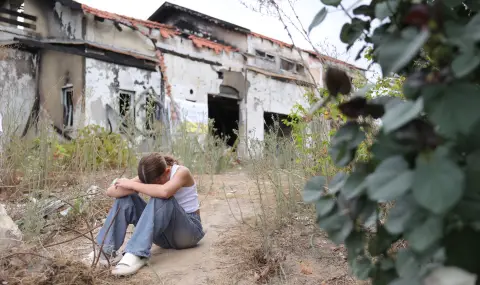Many of the buildings in Tel Aviv fly the Israeli flag with the message “Together we will win”.
At the same time, posters of families of hostages in Gaza can be seen in the streets, calling for them to be returned home, even at the cost of an end to the war in Gaza. Next to them there are posters showing killed soldiers and calling for the fighting to continue until "absolute victory".
These scenes from the economic and cultural center of Israel reveal the great divide in society on the topic: Is it justified to end the war to return hostages?
Israeli society has long been divided
And in the months leading up to the October 7 Hamas terror attacks, Israeli society was divided. For months, protests were held in the streets against the justice reform proposed by the right-wing government.
After the events 1 year ago with 1,200 killed and over 250 kidnapped, Israeli society went into shock. According to many, the government was not in control of the situation, so they took matters into their own hands - setting up civilian emergency centers, launching a campaign to fund the soldiers and organize hotels and housing for those who had to leave their homes. To some extent, civil society and private initiatives have usurped the role of government.
Should the war in Gaza be continued?
A year later, that sense of unity seems to have evaporated. The old divisions are back, this time revolving around the war and hostage disputes. Calls for a deal and the return of people Hamas holds in Gaza have increasingly gone hand-in-hand with criticism of the way Netanyahu's government is running the war. Insults to the relatives of the hostages became a common occurrence - both on social networks and on the streets. According to supporters of the far-right government, the campaign to free the hostages is actually occupied by those sections of society who want the government to fall.
Gil Dickman, a cousin of murdered hostage Carmel Gatt, talks about the comments he received on social media after her death: “They say I am guilty of killing Carmel... Carmel's death amuses them and continues to generate new ones attacks“.
According to Dickman, such comments serve one person - Prime Minister Netanyahu. “This violence is managed as a weapon of the government against the families of the hostages,”, he believes.
Fundamental issues in society changed after October 7
Shmuel Rosner is a journalist and researcher of public attitudes. In his podcast, he discusses “spheres of agreement" - i.e. to what extent Israeli citizens of different political persuasions can agree on the main topics. These fundamental questions have changed after October 7, 2023, he says. On the one hand, the presence of the Israel Defense Forces in the West Bank and Gaza is now seen as necessary by a larger part of society. On the other hand, he says, the war allows radical groups in Israeli society to legitimize some ideas that were previously rather taboo.
One such example is the so-called transfer or forced emigration of Palestinians from the entire territory from the Jordan River to the Mediterranean Sea. "Such ideas used to be on the fringes of Israeli society, but now they have become legitimate topics of conversation." The result is the re-emergence of conflicts that many Israelis thought were behind them, the expert explains.
Tragedies are the last thing that unites people
In the past year, Israel has recorded the worst terrorist attack in its history, a war with Hamas in Gaza, dozens of hostages still held by the terrorist organization and tens of thousands who have fled their homes in northern Israel because of clashes with Hezbollah. Do the citizens of Israel think that the government can handle this situation? A September study by Israel's Institute for National Security Studies hints at the answer. According to him, 31% of Israelis feel “low“ or “very low“ sense of security, with only 21% declaring “high" or “very high“ such.
The number of Israelis leaving the country is increasing. According to official statistics, more Israelis left the country in 2023 than in 2022. And preliminary figures for 2024 show that the number has risen even more.
At the same time, the streets of Tel Aviv are also full of memorial notes for people who lost their lives in this war. And their fates and stories are perhaps the last thing that unites Israeli society.
Author: Felix Tamsut
